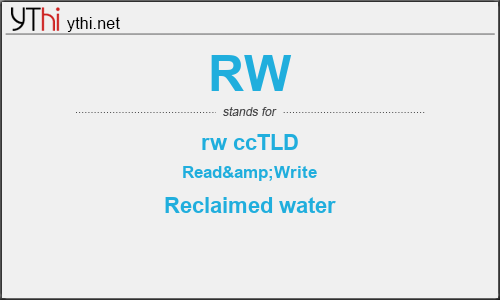What does RW mean? What is the full form of RW?
The Full Form of RW is .rw ccTLD
.rw is the Internet country code top-level domain (ccTLD) for Rwanda.
In addition to registering a Rwanda domain name directly under .rw, RICTA, through accredited and registered registrars, offers as well the following second level domains:
| Generic Second Level Domain Zones | Type of organization |
|---|---|
| .rw | Any general purpose domain name |
| .co.rw | Commercial and Business Organizations |
| .org.rw | Not-for-profit and/or Non-Government Organizations |
| .net.rw | Network Infrastructure Providers |
| .ac.rw | Rwanda Academic Institutions. Authorization must be issued by the Rwanda Ministry of Education or The Rwanda Education Board |
| .gov.rw | Government of Rwanda Institutions. Authorization must be issued by the Office of The President of Rwanda. |
| .mil.rw | This zone is reserved for the Rwanda Defense Forces – RDF |
| .coop.rw | Rwanda Cooperatives. Authorization must be issued by the Rwanda Cooperative Agency. |
| .ltd.rw | Rwanda Limited Companies. Authorization must be issued by the Rwanda Development Board – RDB |
The Full Form of RW is Read&Write
Read&Write Helps students to study, revise, proofread and increase their understanding. Useful tools in Read&Write such as highlighters, voicenotes, vocab tools, audiomaker and more help students to study smarter, more independently and to a high standard.
Read and Write is a text-to-speech program that provides visual and auditory feedback of text. Read and Write has proven to be beneficial for people with learning difficulties, dyslexia or visual impairments, English Language Learners (ELL) and those learning English as a Second Language (ESL). The program includes reading, writing and literacy support:
- Hear web pages and documents read aloud to improve reading comprehension, with choice of natural voices
- Understand unfamiliar words with text and picture dictionaries
- Develop writing skills with word-prediction
- Support independent student research with valuable study skills tools
The Full Form of RW is Reclaimed water
Water reclamation (also called wastewater reuse, water reuse or water recycling) is the process of converting municipal wastewater (sewage) or industrial wastewater into water that can be reused for a variety of purposes. Types of reuse include: urban reuse, agricultural reuse (irrigation), environmental reuse, industrial reuse, planned potable reuse, de facto wastewater reuse (unplanned potable reuse). For example, reuse may include irrigation of gardens and agricultural fields or replenishing surface water and groundwater (i.e., groundwater recharge). Reused water may also be directed toward fulfilling certain needs in residences (e.g. toilet flushing), businesses, and industry, and could even be treated to reach drinking water standards. Treated municipal wastewater reuse for irrigation is a long-established practice, especially in arid countries. Reusing wastewater as part of sustainable water management allows water to remain as an alternative water source for human activities. This can reduce scarcity and alleviate pressures on groundwater and other natural water bodies.
You may have seen a picture of the mayor of a town getting ready to drink a cup of reclaimed wastewater….water that has been treated by a sewage-treatment plant till it is so pure that it (could be) consumed. Naturally, people will not be inclined to drink reclaimed water, even if it is indeed pure enough, but there are many other uses for reclaimed wastewater.
With the scarcity of water in some parts of the U.S. and with water conservation being so important nowadays, the reuse of treated wastewater is becoming more important. No, you don’t have to worry about your drinking water at home coming right from a sewage-treatment plant (although a successful test of this has been done!!), but treated wastewater is being used for certain purposes throughout the country.
The use of reclaimed wastewater helps people in two ways:
- Reclaimed water can supply needed water for some purposes
- Reclaimed wastewater frees up fresh water that can be used somewhere else, such as for drinking water
RW
means
rw ccTLD![]()
Translate rw ccTLD to other language.
Read&Write![]()
Translate Read&Write to other language.
Reclaimed water![]()
Translate Reclaimed water to other language.


Leave a Reply
You must be logged in to post a comment.